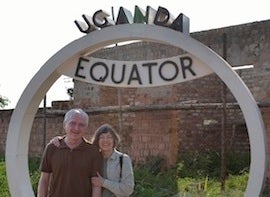Professor Emerita Shares Nursing Expertise in Uganda

Posted in GUMC Stories
 When Judy Baigis, PhD, RN, FAAN, retired from Georgetown’s faculty in 2011, she knew she wanted to pursue international service.
When Judy Baigis, PhD, RN, FAAN, retired from Georgetown’s faculty in 2011, she knew she wanted to pursue international service.
Baigis and her husband Robert Wachbroit, PhD, reviewed various options before deciding on Academics Without Borders Canada.
“The whole idea is to be paired with academic colleagues in developing countries and share our expertise to help address areas the universities have identified for improvement,” says Baigis, professor emerita of nursing.
Service in Uganda
As a public health nurse with many years of research and teaching experience, Baigis was partnered with Aga Khan University, which has sites in eight countries.
“The university wanted nursing faculty to work with the faculty in East Africa to introduce them to more student-centered learning pedagogies and to work with them on developing lesson plans,” says Baigis, who was assigned to the Kampala, Uganda campus.
During her two-month stay – between August and September 2012 – she worked with faculty members on teaching strategies, lesson planning, and preparation of their scholarly activities for publication.
Mental Health Services
One faculty member, who started his own community-based organization to help treat mental illness – which is often stigmatized, wanted to figure out a better way to engage students in psychiatric-mental health nursing coursework, Baigis notes.
“Students are much more interested in medical-surgical nursing because it is easier for them to figure out through physical assessments what to do,” she says. “I suggested that he have the students really focus on how they listen to a person with mental illness.”
The approach was met with success.
“He started doing that to much success for the students and for the patients – who for the first time were having people really listen to their stories about the effect of the illness on their families and themselves and their comments on the health professionals caring for them,” she says. “The students also were able to articulate their concerns in caring for people who have been diagnosed with mental illnesses.”
‘Absolutely Worth It’
Baigis also worked with the same faculty member on strategies to engage the traditional healer community in the nursing students’ education, as well as other faculty on research project mentorship.
The faculty also invited her to deliver a lecture on qualitative research. Through this exercise, the students and she did a qualitative study in the classroom.
Baigis says she is happy with her decision to participate in the experience, which she completed while her husband consulted on a National Cancer Institute-based project in East Africa on Burkitt’s lymphoma and malaria.
“It was absolutely worth it,” she says. “I am really serious when I say I found every minute thrilling. I feel I was able to put all of my background to use.”
By Bill Cessato, NHS Communications
